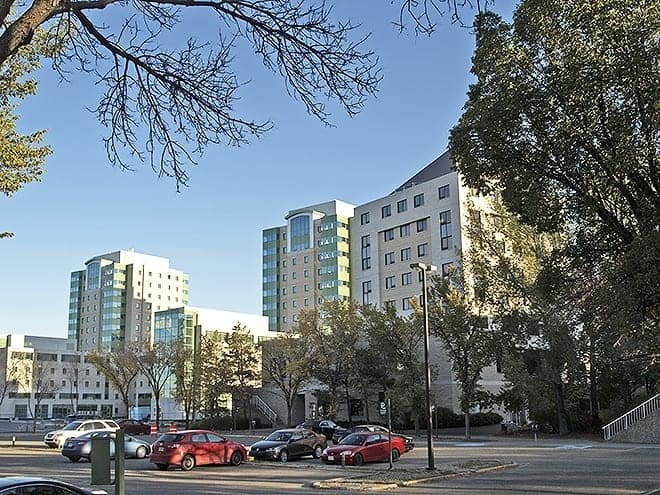The big bad budget


The U of R is still seeking $13.3 million from the province for their new residence towers. Photo – Brett Nielsen
When does growth stop being a good thing?
As part of the development process for the 2016-17 budget, the University of Regina held an open forum on Monday Feb. 8. Hosted by Provost Thomas Chase and Vice-President (Administration) Dave Button, the forum addressed several issues facing the University, and how they are to be addressed in the upcoming budget.
The U of R is asking for a 4.41 per cent increase in its operating grant from the provincial government, warning that they will be forced to cut $13.6 million from operating budgets if the grant does not increase.
The 2016-2017 Operations Forecast also notes a desperate need for plant maintenance and renewal funding “if classroom and building closures are to be avoided.” According to the forecast, “adequate building rehabilitation and renovation in a cost-effective manner has become impossible.”
Chase noted the difficulties in securing the remainder of the government funding promised for the construction of Kīšik towers last year. Initially the U of R had requested $24.3 million from the province, $11 million of which was paid.
“A verbal agreement was made,” said Chase, before adding that “the financial situation [for the province] has changed” since the initial agreement was made.
Button also defended the decision to move ahead with the construction of the new residence, citing the “tangible benefits” of constructing the residence sooner rather than later, including lower interest rates, and better student retention.
Button stated that University administration was “still optimistic that we will get all of the money,” but noted that the delay might mean higher rent for students, and a longer payback period on existing loans.
Chase also noted that the residence system was “completely separate” from the operating budget of the University, and that College West, built in 1974, had only been fully paid off recently.
Another issue raised at the forum was that of recruitment, and the continued expansion of the U of R. Enrollment has increased by 21 per cent since 2009, with enrollment currently at 14,360 students. Chase noted that while enrollment numbers have increased for the past seven years, the number of students available in the University’s traditional catchment area is projected to decline until approximately 2022.
“It means we have to recruit more students from outside that area,” said Chase. “We need to recruit more Canadian students from outside Saskatchewan, and we need to think very carefully about our international enrollments as well.”
Chase noted that students recruited from further away tend to be more difficult to attract and retain, and questioned upper limits of this expansion.
“How big can this campus become? How much do we want to grow this campus in an increasingly competitive environment?”
In addition to questions of population, Chase noted the difficulties in striking an effective and attractive balance between students at the graduate and undergraduate levels, and between professional and research degree programs. These questions were posed to the attendants as upcoming challenges, rather than addressed directly during the budget planning process.
Another issue addressed at the forum was the disparity in government funding between the universities of Regina and Saskatchewan, which Chase described as “unfair.”
“Is that young student in Regina worth less than their counterpart? We believe that there has been an imbalance here, and we are working very hard to get the government to take a look at this.”
“Needless to say,” Chase added agitatedly, “our colleagues at the U of S have assembled a strong case to maintain the status quo.”
This town hall meeting was the latest in a series intended to make the budget planning process more transparent, and give the community a greater voice in the process. As a result, the full video recording of the meeting will be made available on the University website. The comprehensive budget plan, operations forecast, and more can be found at www.uregina.ca/orp/budget/2016-17-budget.html.








